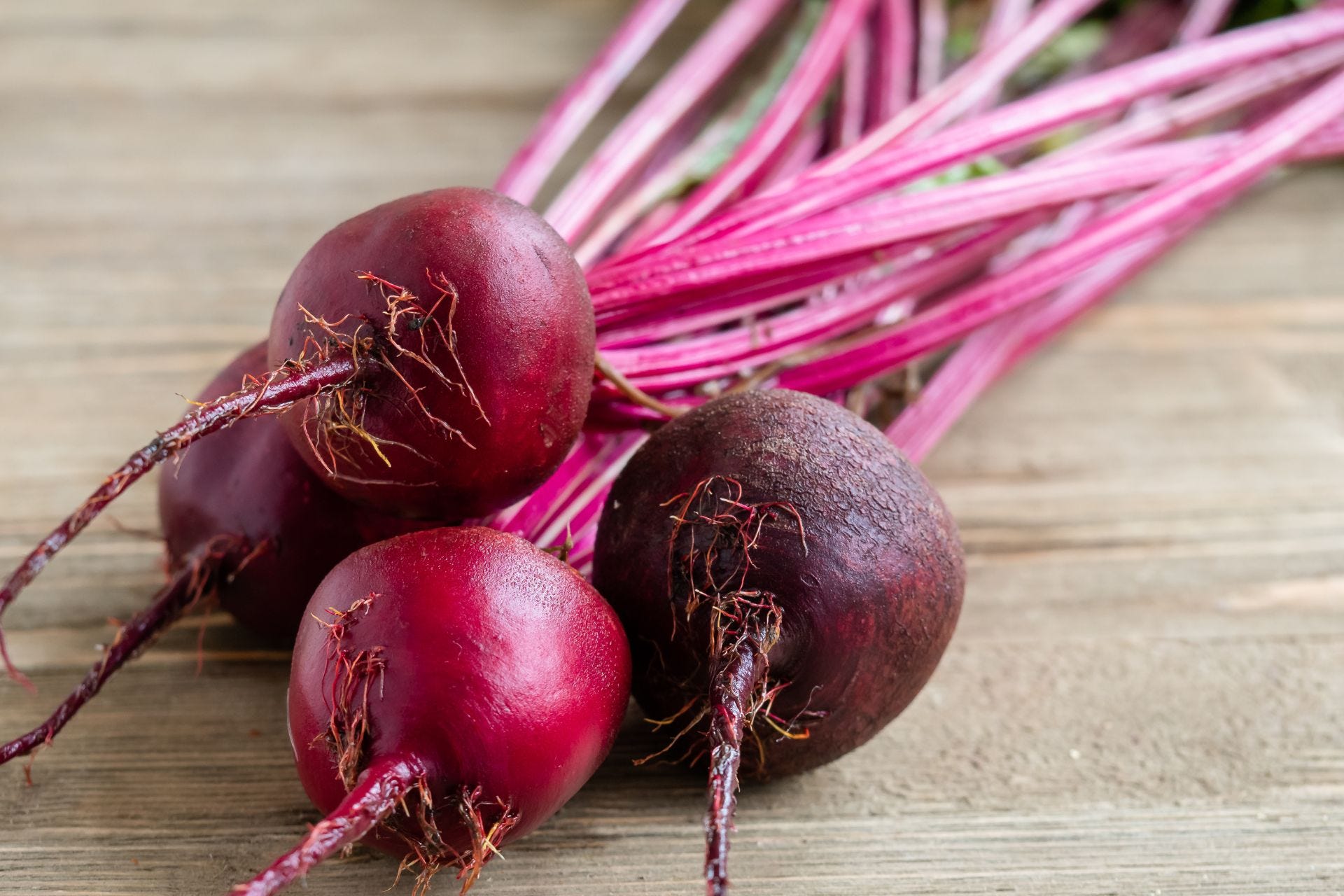
Beets, Bolstering Health Since Antiquity
Beetroot has been used as a medicinal food for centuries and has been documented to treat a variety of health conditions. Historically, beets were used to treat anemia and fatigue, as they are a rich source of iron and other essential vitamins and minerals. Additionally, beets were also used to treat cardiovascular disorders, as they contain high levels of nitrates, betalains, and other phytonutrients that promote heart health.
Beets were also recognized for their anti-inflammatory and antioxidant properties, which have been linked to a reduced risk of chronic diseases such as heart disease and cancer. In ancient Rome, beetroot was used as a tonic for digestive issues and to improve liver function. Ancient Egyptians and Greeks also used beets for medicinal purposes, including for wound healing and as a treatment for skin conditions.
Today, beetroot is still widely recognized for its numerous health benefits, and as a functional food, is among the top ten most potent antioxidant-rich vegetable. With increasing interest in the role of food as medicine, the study of beets and their potential health benefits has become a growing field budding with exciting research.
Beetroot, Nutrient Dense by Design
Functional foods are foods that provide health benefits beyond their basic nutritional value. They are thought to positively impact specific physiological functions and reduce the risk of certain health conditions. The health benefits of beet root have been the subject of increasing research over the past few decades. Beetroot is considered a functional food due to its rich nutrient profile and phytochemical content. By incorporating beetroot into the diet, individuals may be able to improve their overall cardiovascular health and reduce the risk of developing certain diseases. In recent years it has gained attention for its potential to improve cardiovascular health, aid in exercise performance, and more.
Beetroots are rich in vitamins C, A, E, K. They have an important content of B-vitamins (thiamine, riboflavin, niacin, pantothenic acid, pyridoxine, as well as folic acid) and powerful antioxidants, including triterpenes, sesquiterpenoids, carotenoids, flavonoids, betalains, and phenolic compounds. Beetroots are a good source of minerals, like iron, manganese, magnesium, potassium, sodium, phosphorus, zinc, copper, boron, silica, and selenium.
Beetroot’s Phytochemical Allstar - Nitrates
The phytonutrients found in beetroot include polyphenols, flavonoids, nitrates and betalains. These phytonutrients play a crucial role in supporting cardiovascular health, especially through reducing the impact of oxidative stress and inflammation.
One of the key components of beetroot is nitrates. Nitrates are converted to nitric oxide in the body, which has been shown to have numerous cardiovascular benefits. Nitric oxide is a potent vasodilator, allowing for improved blood flow and reduced blood pressure. As a nitrate source, consuming beetroot provides the natural ingredient to improve the function of the endothelium, the inner lining of blood vessels, which is important for improving physical endurance and maintaining cardiovascular health.
Beets are Bursting with Betalains
Another important phytochemical found in beetroot is betalains. Betalains, the red and yellow pigments found in beetroot, have potent antioxidant activity that can help provide important protection to reduce risk of cardiovascular disease. But if your clients are new to consuming beetroot, remind them not to panic if they notice something strange when using the bathroom. Betalains can be challenging to metabolize for 14% of individuals, resulting in beeturia, the production of pink-tinged urine post-consumption of beetroot. Betalains have been shown to have numerous health benefits, including reducing oxidative stress and inflammation, improving cardiovascular health, and supporting the liver’s detoxification processes.
Additionally, betalains, been shown to have significant cholesterol-lowering effects. Betalains are also believed to help lower cholesterol levels by suppressing the activity of HMG-CoA reductase, an enzyme that is involved in cholesterol synthesis, leading to reduced levels of low-density lipoprotein (LDL) cholesterol, which is known as "bad" cholesterol. This, in turn, leads to a decrease in the production of cholesterol, which is a risk factor for cardiovascular disease. Moreover, betalains may also stimulate the production of bile acids, which can help reduce cholesterol levels by promoting the excretion of cholesterol from the body. Additionally, betalains have been shown to increase the expression of genes involved in the excretion of cholesterol from the body, further contributing to the reduction in cholesterol levels.
Overall, the combination of nitrates and betalains make beetroot a valuable addition to a healthy diet, particularly for individuals looking to support their cardiovascular health. Further research is needed to fully understand the impact of these and other nutrients and phytochemicals in beetroot, but the available evidence suggests that it can be a valuable food for maintaining cardiovascular health.
Beets are Hard to Beat for Cardiovascular Support Top of Form
Beetroot has been the subject of several human clinical trials examining its impact on cardiovascular health. These trials have used various forms of beetroot including juice, powder, and extracts. The scientific evidence on the cardiovascular benefits of beetroot is growing, with a number of studies suggesting that consumption of beet root and its various forms (juice, powder, extracts) has the potential to improve heart health in various ways; via its nitrate content which affects blood pressure and blood flow and via betalain which affects cholesterol synthesis, inflammation pathways and physical endurance.
Beetroot - A Nitrate Delivery System
The nitrate content of beets directly affects the circulatory system, improving blood pressure and blood flow. Beetroot contains nitrates which may be converted to nitric oxide in the body. Nitric oxide has been suggested to act as a vasodilator, potentially promoting relaxation and widening of blood vessels, which may result in a reduction of blood pressure. Several human clinical trials have explored the potential of beetroot supplementation to support healthy blood pressure, including in both healthy individuals and those with concerns about hypertension.
The nitrates found in beetroot may not only support healthy blood pressure but may also contribute to improved blood flow. Maintaining healthy blood flow is crucial for supporting cardiovascular health and may aid in the delivery of oxygen and nutrients to the heart and other organs, potentially reducing the risk of heart disease, stroke, and other cardiovascular concerns.
Beetroot Cools the Fire of Inflammation
Inflammation and elevated cholesterol levels are considered major risk factors for cardiovascular disease, and incorporating beetroot into one's diet may help support a healthy cardiovascular system. Beetroot contains several compounds that are known to have anti-inflammatory effects, which can be beneficial for overall health, Including heart health. One of the most notable anti-inflammatory compounds in beetroot is betalains, which are pigments that give the root its deep red color. Betalains have been shown to have strong antioxidant and anti-inflammatory properties and have been linked to reduced oxidative stress and inflammation in the body. The betalains in beetroot regulate peroxidation by scavenging lipid free radicals and then inhibiting peroxidase, nitrite-induced oxidase, and low-density lipoprotein synthesis.
Flavonoids and polyphenols are other important anti-inflammatory compounds found in beetroot. These compounds help to protect the body against oxidative stress and inflammation by neutralizing harmful free radicals. They also have a direct impact on the cellular pathways that contribute to the development of inflammation, helping to reduce the production of pro-inflammatory substances.
Vitamin C, which is also abundant in beetroot, is another important anti-inflammatory compound that plays a critical role in maintaining the body's antioxidant defense system and has been shown to reduce oxidative stress and inflammation. Additionally, it has been linked to a reduction in inflammation markers in the blood, suggesting that it may be an effective way to lower the risk of developing cardiovascular disease. The exact mechanism by which beetroot's anti-inflammatory compounds work is not fully understood, but it is thought to involve multiple pathways, including the activation of anti-inflammatory signaling pathways, the inhibition of pro-inflammatory enzymes, and the reduction of oxidative stress.
Beat Low Energy with Beets
There is some preliminary research that suggests that beetroot powder may help to reduce fatigue in certain populations. This is believed to be due to the high nitrate content in beetroot, which is converted into nitric oxide in the body. Nitric oxide is a signaling molecule that can improve blood flow and oxygen delivery to the cells, thereby increasing cellular energy levels. Some research has shown that beet root consumption can enhance exercise performance, reduce muscle fatigue, and improve overall energy levels.
It is recognized that dietary nitrate decomposes into nitrite and subsequently converts to nitric oxide and other nitrogen-active intermediates that affect the physical performance of athletic populations. Numerous clinical studies have been conducted to investigate the relationship between beet root, nitrates, energy levels and exercise endurance.
Beet root is rich in nitrates, which are converted into nitric oxide in the body. Nitric oxide has been shown to enhance athletic performance and improve endurance during exercise by increasing blood flow and reducing the amount of oxygen needed to produce energy. The increased blood flow also helps remove waste products from the muscles, allowing for faster recovery. The increased nitric oxide levels that may result from beetroot supplementation may improve oxygen delivery and reduce the oxygen cost of exercise, making it a potential dietary addition for individuals who are physically active. Although more research is needed, these findings suggest that beet root could have a potential role in enhancing cellular energy and combating fatigue associated with age or mitochondrial dysfunction.
Beets Blast Free Radicals
Antioxidants play a crucial role in promoting health by neutralizing free radicals and preventing cellular damage. Beetroot contains several key antioxidants, including glutathione, which has been shown to have potent detoxifying properties. Glutathione is a tripeptide found in most living cells and is known for its ability to neutralize harmful substances, including heavy metals and environmental pollutants. Additionally, beetroot also contains other antioxidants, including flavonoids, phenolic acids, and betalains, all of which help to protect our cells from damage. Betanin, a metabolite of betalain, exhibits an antioxidant activity that is ten times higher than tocopherol, and three times higher than catechin.
The antioxidant properties of beetroot have been linked to a range of health benefits, including reduced risk of chronic diseases, such as cardiovascular disease, certain types of cancer, and type 2 diabetes. Additionally, the detoxifying properties of glutathione may help to promote liver health and improve overall immune function. It's important to note that more research is needed to fully understand the potential health benefits of beetroot's antioxidants. However, incorporating beet root into a healthy diet is a simple way to increase antioxidant intake and potentially support overall health.
Beets Balance the Biome
The gut microbiome is a complex and delicate ecosystem that plays a crucial role in maintaining overall health and wellness. One of the ways in which we can positively impact the gut microbiome is by consuming fiber-rich foods, such as beetroot. Beetroot is an excellent source of fiber, particularly soluble fiber, which has been shown to have prebiotic effects on the gut microbiome.
Along with its fiber content, beetroot also has the potential to positively impact the gut microbiome through the presence of Lactobacillus species. Fermented beetroot, for example, has been found to contain high levels of Lactobacillus species, which are known for their probiotic properties. These bacteria have been shown to improve gut health by helping to maintain a healthy balance of gut bacteria, reducing inflammation, and improving gut barrier function.
Fermentation can also increase the bioavailability of certain nutrients and antioxidants, such as betalains, Fermented beets also adds an additional source of probiotics which can improve gut health and support digestion. The fermentation process can also break down the tough fibers in beets, making them easier to digest and reducing the risk of digestive issues such as bloating and gas.
The relationship between gut health and overall health is complex and still being studied, but evidence suggests that maintaining a healthy gut microbiome is key for overall health and well-being. The fiber and probiotic benefits of beetroot, especially when fermented, make it a promising food for promoting gut health and may contribute to the cardiovascular benefits of beetroot as well.
Beets Bring Brilliant Balance to Health
Throughout the article, we explored the history of beet root as a medicinal food, the various nutrients, and phytochemicals it contains, and the results of human clinical trials that have been conducted on the relationship between beet root consumption and cardiovascular health. We found that beet root has been traditionally used to treat anemia and cardiovascular disorders, and it has been shown to have potential benefits for cardiovascular health due to its high content of vitamins and minerals, nitrates, and betalains. In addition, we reviewed research on the antioxidant and anti-inflammatory properties of beet root, as well as its impact on exercise endurance and cellular energy. Finally, we discussed the potential probiotic benefits of beet root fiber and the current state of scientific evidence on the relationship between beet root and cardiovascular health.
In conclusion, beetroot is a nutrient-dense food with a long history of medicinal use. The numerous vitamins, minerals, and phytonutrients in beetroot, particularly nitrates and betalains, have been shown to have a significant impact on cardiovascular health. Incorporating beetroot into your diet may help reduce your risk of developing cardiovascular disease and improve your overall health. Further research is needed to fully understand the extent of the health benefits of beetroot, but the current evidence suggests that it is a promising food for improving cardiovascular health.
References
- Ceclu L. and Nistor OV. Red Beetroot: Composition and Health Effects – A Review. Journal of Nutritional Medicine and Diet Care. 2020, 6(1).
- Clifford T, Howatson G, West, D. et al. The Potential Benefits of Red Beetroot Supplementation in Health and Disease. Nutrients. 2015, 7, 2801-2822.
- Chen L., Zhu Y., Hu Z, et al. Beetroot as a functional food with huge health benefits: Antioxidant, antitumor, physical function, and chronic metabolomics activity. Food Science & Nutrition. 2021, 9, 6406-6420.
- Mirmiran P., Houshialsadat Z., Gaeini Z., et al. Functional properties of beetroot (Beta vulgaris) in management of cardio-metabloic disease. Nutrition & Metabolism. 2020, 17:3
- Chat GPT









